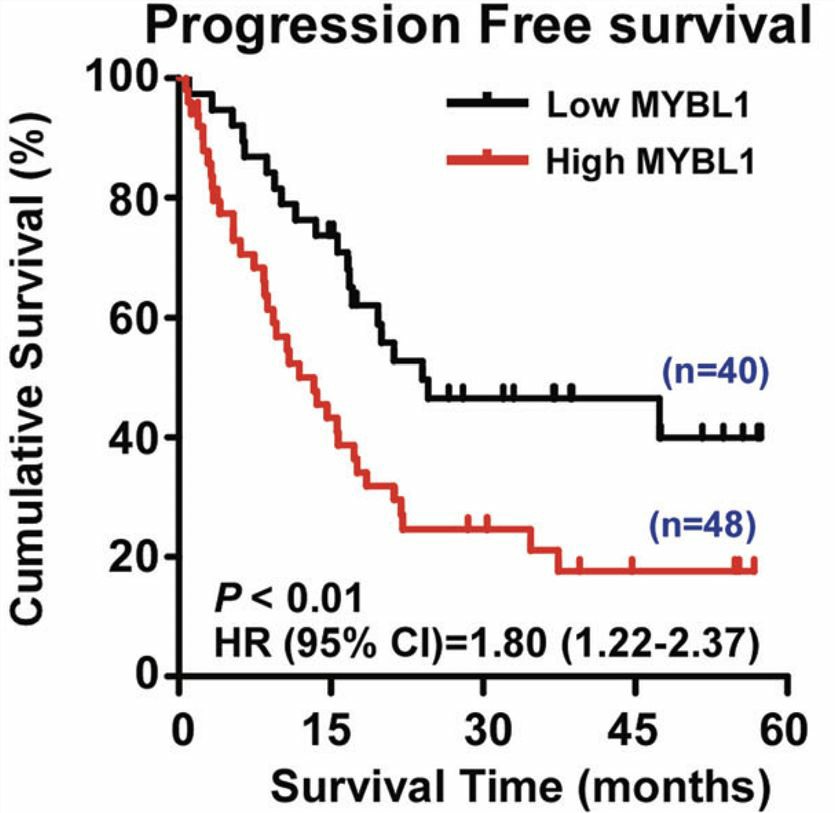MYBL1 and Associated Diseases
Founded by outstanding scientists, Creative Biolabs is focused on providing a comprehensive understanding of your project about gene therapy. Our well-trained team will provide you with detailed service to solve all your complex problems in the field of gene therapy.
Overview of MYBL1
In humans, MYB proto-oncogene like 1 (MYBL1) is a protein encoded by the MYBL1 gene. MYBL1, as a transcription factor located in the nucleoplasm, involves in positive transcriptional regulation via RNA polymerase II, partially by the specifical recognition of the 5'-YAAC[GT]G-3' sequence. In the process of male meiosis, MYBL1 is regarded as a master regulator in activating the expression of piRNA precursor RNAs and piRNA metabolism-associated genes and promoting the expression of piRNAs. Normal piRNA metabolic process is essential for the integrity of the germline.
MYBL1 in Disease
MYBL1 plays a critical role in gene transcription and gene silence mediated by RNA. Ectopic expression of MYBL1 is associated with cancer occurrences such as adenoid cystic carcinoma, triple-negative breast cancer, and hepatocellular carcinoma.
- Triple-negative breast cancer
MYBL1 is related to the growth of triple-negative breast cancer (TDBC). TDBC, one of the subtypes of breast cancer, expresses low levels of ER, PgR, and HER2. Compared with other subtypes, TDBC has typical characteristics of high malignancy and relapse rate. According to the consequence of the self-organizing map from primary TDBC tissues, transcription factor MYBL1 is associated with TDBC by its negative correlation to ER and HER2. MYBL1 involves in the TDBC growth by the signaling pathway of Wnt/β-catenin or cancer stem cell-associated gene CD44. Taken together, MYBL1 does involve in the expression of cell growth-related genes.
- Hepatocellular carcinoma
MYBL1 may be a novel biomarker of hepatocellular carcinoma (HCC). HCC appears frequently in chronic liver disease patients and is one of the highly vascularized solid tumors. In HCC patients, upregulation of MYBL1 is associated with high endothelial vessel density and poor prognosis. Overexpression of MYBL1 in HCC cells enhances the neovascularization and metastasis, whereas silence of MYBL1 will reverse it. Angiopoietin-2 (ANGPT2) is a secreted factor related to blood vessel growth. MYBL1 can bind to the promoter of ANGPT2 and upregulate ANGPT2 mRNA transcription. Treatment with monoclonal ANGPT2 antibody can efficiently inhibit neovascularization and metastasis caused by MYBL1 overexpression. In summary, MYBL1 induces angiogenesis in HCC by upregulating the expression of ANGPT2.
 Fig.1 High expression of MYBL1 is associated with poor cumulative survival. (Zhu, 2022)
Fig.1 High expression of MYBL1 is associated with poor cumulative survival. (Zhu, 2022)
Creative Biolabs has a team of professional and excellent scientists with years of experience in gene therapy and can provide one-stop disease-specific gene therapy-associated strategies. Please feel free to contact us for more details about your MYBL1 project.
Reference
- Zhu, J.; et al. MYBL1 induces transcriptional activation of ANGPT2 to promote tumor angiogenesis and confer sorafenib resistance in human hepatocellular carcinoma. Cell Death Dis. 2022, 13: 727. Distributed under Open Access license CC BY 4.0, without modification.
